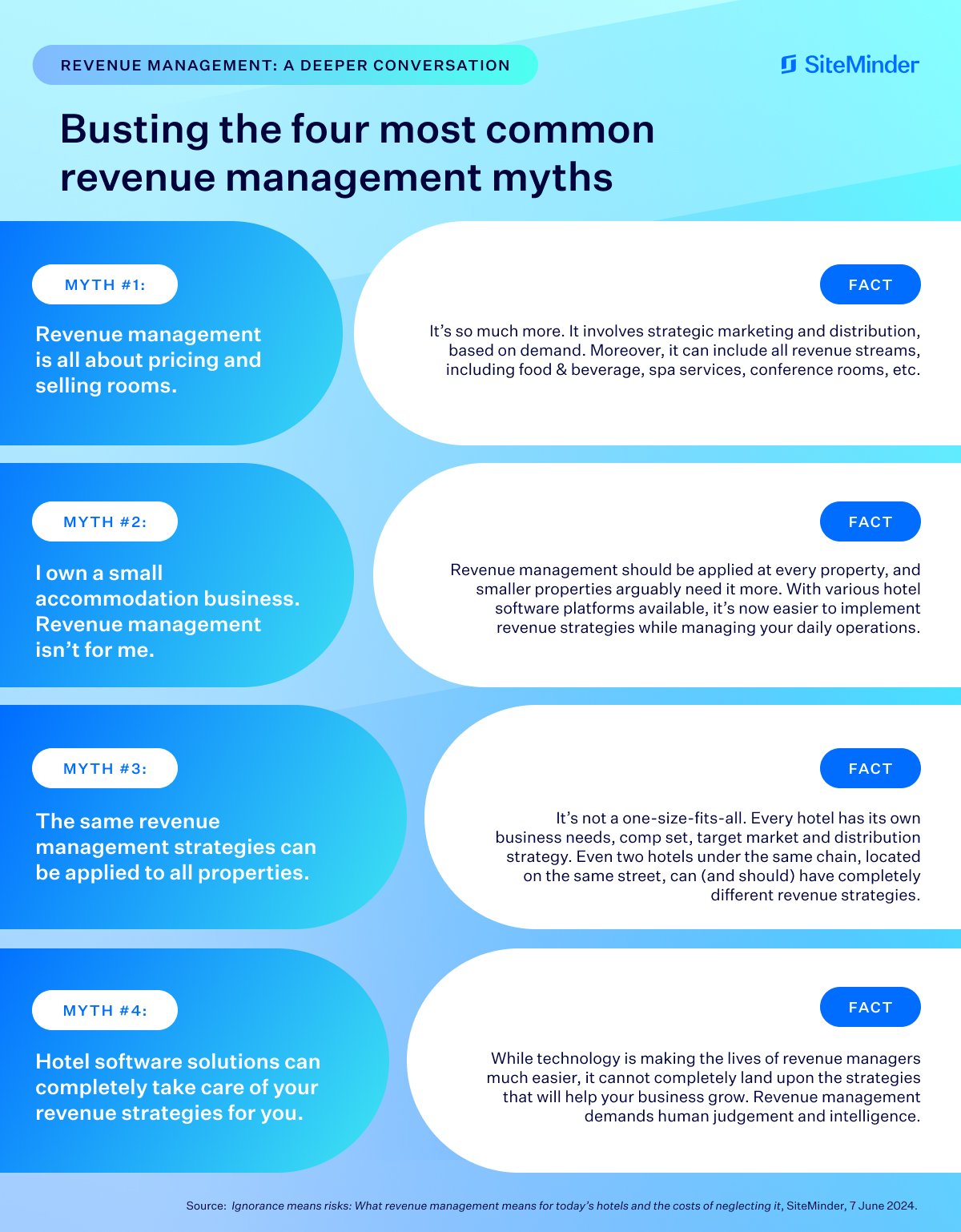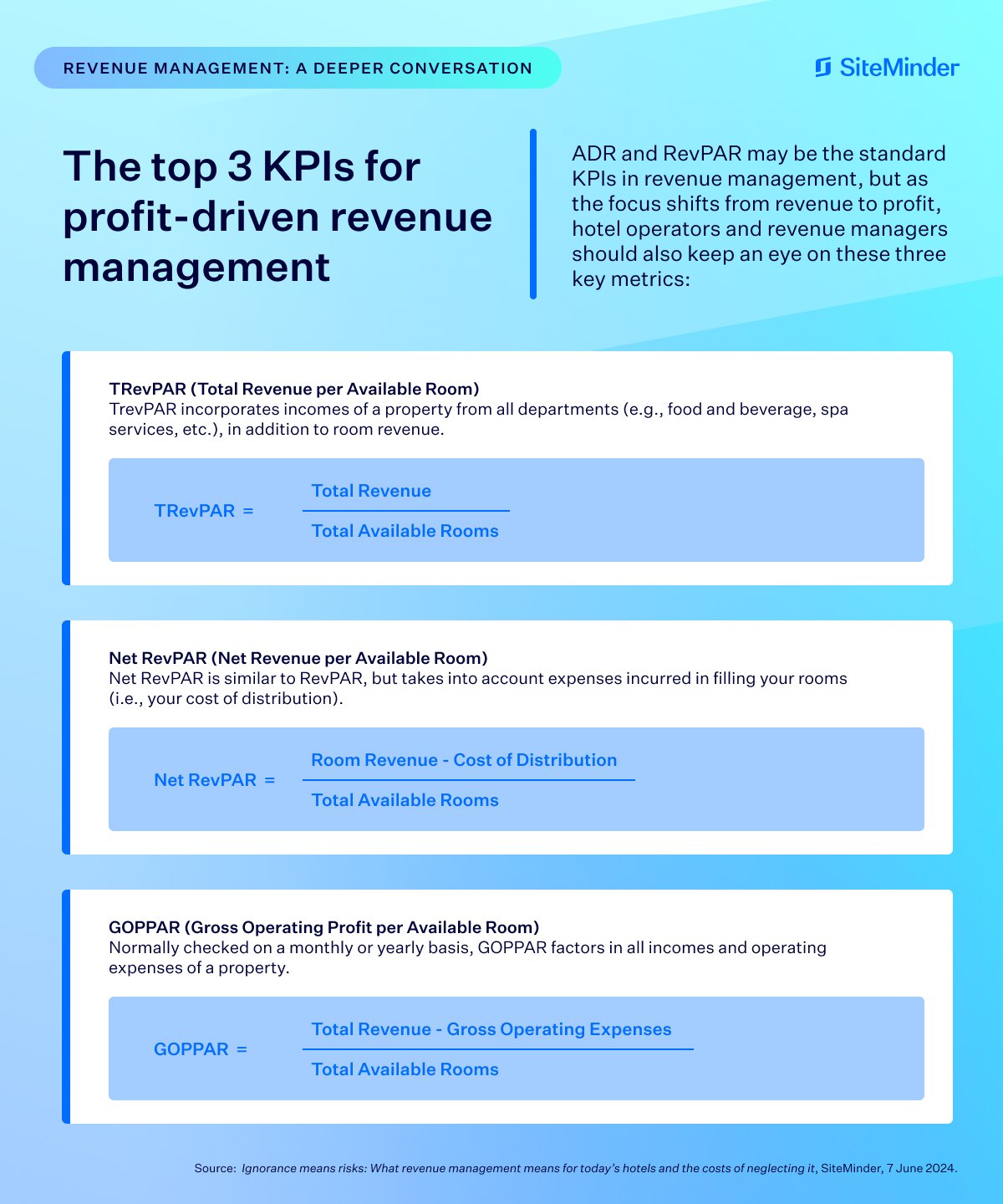Share this
A quick search on the internet yields a wide range of definitions for ‘revenue management’. Some of these take a theoretical, almost academic approach and, in several instances, there are iterations of revenue management’s classic definition: ‘selling the right room, to the right guest, at the right time, for the right price’.
Yet, it’s important to consider that the demands of revenue management have drastically changed. With rising costs, evolving guest behaviours and the varying types of accommodation businesses that have emerged, revenue management now means different things to different properties.
For instance, Diego De Ponga, former Corporate Director of Revenue Management at Palladium Hotel Group and now CEO at Port Hotels, believes the classic definition of revenue management is unrealistic in today’s market, where selling inventory demands more flexibility.
“I define revenue management as a way for accommodation properties to earn more,” says De Ponga. “These days, it would be impractical to use the classic definition, as I will sometimes sell at a less ideal time, at the right price. If you’re a revenue manager for a property with 100 rooms, your task is to maximise profits from all those rooms, regardless of market conditions.”
De Ponga’s nuanced perspective on how revenue management works in today’s landscape is a result of years of experience in the field. But for many of the world’s independent accommodation providers, revenue management remains unfamiliar territory, often marked by misconceptions and misguided practices.
Overwhelming demands
The lack of revenue management know-how among many accommodation providers is partly due to some only beginning to grasp the basics of managing a property – a complex undertaking in itself.
“Some owners of accommodation properties are experienced business people, but new to the day-to-day operations of a hospitality business,” says Tamie Matthews, CEO and Founder of RevenYou, a consultancy for independent hotels. “While they may be excited to be in charge of the business, everything is new. They are having to learn everything all at once.”
Revenue management is therefore considered a tedious, if not optional, exercise for these time-poor owners preoccupied with other aspects of running a hotel. In fact, many owners of small independent properties we spoke with confirmed that they were ‘too busy’ to pursue learning about revenue management, given the overwhelming demands of their businesses.
It goes without saying, however, that many thousands of properties around the world, particularly smaller independents, are already implementing measures to drive revenue – without even knowing it.
According to De Ponga, hotel software solutions such as channel managers and revenue management systems (RMSs) have democratised the practice, owing to the rise of online travel agencies (OTAs).
“I can’t imagine our job without a channel manager given all the OTAs out there. This tool gave revenue managers the opportunity to develop distribution strategies. RMSs allowed us to go deeper in analysis,” De Ponga shares.

The shift to a profit-oriented paradigm
Despite the availability of technology, the lack of a deeper, more strategic understanding of revenue management among property owners has often led to counterproductive practices that leave money on the table and hamper the growth of their businesses.
Speaking from her experience, Matthews notes the outdated approaches that some owners would take when it comes to their commercial strategies. “Prior to working with RevenYou, we found that many owners used one price for 365 days. They would sell the same price to everyone and assume that 100% occupancy was the ultimate goal. They didn’t know who they were competing against nor did they have a list of events that could drive demand and ultimately increase profit. They were selling their own accommodation within the silo of their own making.”
This perilous, misguided approach comes at a time when revenue management is moving towards a focus on profitability. With rising prices, accommodation providers across all segments are compelled more than ever to consider all costs and opportunities associated with their services and amenities.
“Revenue management is about optimising all available spaces,” says Annemarie Gubanski, CEO and Founder of Taktikon, a revenue and distribution consultancy. “It can be rooms, it can be chairs, it can be treatment rooms or meeting rooms … Not only do we need to optimise every square metre, but we also need to make sure that the whole property remains profitable. That, for me, is the optimum goal of revenue management.”
As revenue management transcends room occupancy and pivots to a profit-oriented paradigm, it’s clear that accommodation owners can no longer afford to ignore the critical role of the practice in the current landscape.
“The primary objective of revenue management should be profits, not just income, especially now that you have to factor the costs of distribution. Profit is the DNA of the business and needs to be led by both the general manager and the revenue manager,” says De Ponga.

A change in mindset
The road to adopting revenue management may seem long and winding for accommodation owners and their teams, already encumbered by the day-to-day tasks of hotel operations. There are, however, practical ways to gradually embrace this practice as it moves towards a profit-oriented paradigm, apart from relying on technology.
It all starts with a change in perspective. For Gubanski, accommodation providers need to leave behind the old mindset that revenue management is an exclusive club for large brands if they are to fully realise the profitability of their businesses.
“One of the misconceptions surrounding revenue management is that it’s not for small properties, that they don’t really need revenue management, more so if their property is not in a dynamic market, but that certainly doesn’t matter. You can apply revenue management to any type of property. And, it’s the smaller properties that actually do need it more because they have to make sure that every space is optimised.”
Other teams at a property would also do well to understand the fundamentals of revenue management. If the practice now entails maximising all available spaces and services that hotels can offer, a concerted effort among departments to understand the ‘whys’ and ‘hows’ of revenue management is increasingly vital.
For property owners and revenue managers, this means reaching out and engaging with teams such as the front desk and F&B, who are pivotal in bringing more revenue and boosting the hotel’s profitability.
De Ponga says, “We need to open ourselves up to the hotel and explain revenue management in an easy way. Speak with other departments, including the front office, because they manage the upselling and cross-selling strategies that can give you two to three percent of your RevPAR. You need to teach them how to control pricing when upselling or cross-selling, or even ask them: ‘Why does our spa have the same price during the whole season?’”








